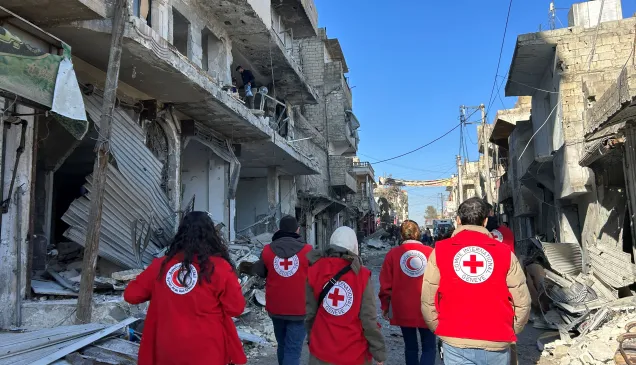With Syria now in its 11th year of unrelenting crisis, the International Red Cross and Red Crescent Movement again calls on the international community to not forget the continuing humanitarian needs in the country. Right now, people in Syria need continued solidarity and committed support in order to cope with ongoing hostilities, economic woes, crippled infrastructure, and immense humanitarian needs in the country. At present at least 14.6 million people need assistance and are more dependent on aid than ever before.
Humanitarian actors, including the International Red Cross and Red Crescent Movement, provide a lifeline in response to enormous needs. Despite security challenges and political blockages, we are finding ways to repair critical infrastructure and make sure people have access to basic services such as clean water, electricity, and functioning health services. To be able to meet these humanitarian challenges, we need continued financial support from the international community.
The importance of support to continue vitally needed humanitarian action cannot be overstated. While much of the world's attention has turned towards other crisis, such as in Ukraine, millions remain in need in Syria.
The armed conflict in Ukraine is adding another layer of challenge to the situation in Syria." said Fabrizio Carboni, ICRC's regional director for Near and Middle East. "We're worried about more food insecurity and ever-increasing prices. Even if the Ukraine conflict ended tomorrow the underlying impact of the climate crisis and the pressure this is putting on water resources and food production, would still leave us with many issues to cope with.
Our Movement has been responding to the needs of people in Syria since the first days of the conflict, with volunteers and staff providing vital aid to people in areas that others cannot reach. Without them, this humanitarian catastrophe would have been much worse. Each month, we assist millions of people inside Syria; for this life-saving work to continue, humanitarian workers must have sustained, safe, and non-politically motivated access to all people, families and communities in need. We ask that States and all parties to the conflict ensure international humanitarian law is respected in their operations.
Dr. Hossam Elsharkawi, IFRC Regional Director for the Middle East and North Africa said: "We have seen with the Ukraine crisis how reducing restrictive measures on humanitarian activities has enabled our Movement to rapidly reach millions of people who need assistance, desperately. I call on donors, to apply the same flexibility to the Syrian context. Ideally, by extending the same humanitarian exemptions and licenses. This will create better conditions to minimize unnecessary suffering and bring dignity to affected people."
Millions of Syrians living outside their homeland also continue to need support; neighbouring countries currently host the majority of people who have fled from violence in Syria. In Turkey, Lebanon, Jordan and Iraq, National Red Cross and Red Crescent Societies are providing support to those who have fled, as well as the communities who host them. Countries in Europe have been implementing a wide range of activities to help Syrians integrate into their host communities, from offering psycho-social support programmes, to running reception centres, to facilitating reunification procedures with family members left behind.
For further information please contact:
• ICRC: Jesus Serrano Redondo (Geneva)
M +41 79 275 69 93 jserranoredondo@icrc.org
• IFRC: Rana Sidani Cassou
M: +41 76 671 57 51 / +33 6 75 94 55 15
rana.cassou@ifrc.org



